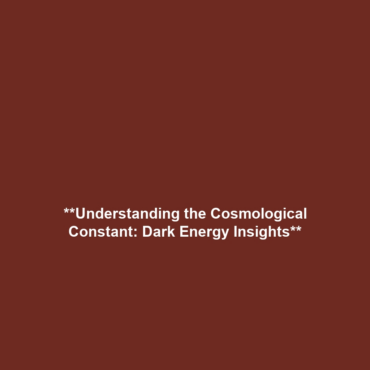<>
The Cosmological Constant and Its Implications
Introduction
The Cosmological Constant, often denoted by the Greek letter Lambda (Λ), is a fundamental parameter in cosmology that significantly influences our understanding of the universe. As part of the broader category of Dark Matter & Dark Energy, the Cosmological Constant plays a vital role in explaining the accelerated expansion of the universe. By proposing a force that counteracts gravitational attraction, it provides insights into the mysterious dynamics of cosmic structures. Exploring the implications of the Cosmological Constant is essential for grasping the complexities of dark energy and its relation to dark matter.
Key Concepts
Understanding the Cosmological Constant
The Cosmological Constant was first introduced by Albert Einstein in 1917 as part of his general theory of relativity to allow for a static universe. Its significance has evolved with the discovery of the universe’s accelerated expansion in the late 20th century, leading to renewed interest in dark energy theories.
Role in Dark Matter and Dark Energy
In the context of Dark Matter & Dark Energy, the Cosmological Constant contributes to the energy density of the universe. It represents a form of energy inherent to empty space, which has implications for the fate of the universe. Scientists have postulated that the Cosmological Constant accounts for approximately 70% of the universe’s total energy density, highlighting its crucial role in cosmological models.
Applications and Real-World Uses
The Cosmological Constant has far-reaching implications beyond theoretical physics. Here are some significant real-world applications:
- Scientific Research: The Cosmological Constant informs models used in astrophysics and cosmology, aiding in the understanding of cosmic evolution.
- Observational Astronomy: It is essential for interpreting observations from telescopes that probe distant galaxies and cosmic microwave background radiation.
- Space Exploration: Insights gained from studies of dark energy may influence future techniques for interstellar travel and space navigation.
Current Challenges
Despite its importance, the Cosmological Constant presents several challenges to researchers:
- Measurement Issues: Accurately measuring the value of the Cosmological Constant remains a significant challenge due to discrepancies in observational data.
- Theoretical Discrepancies: The fine-tuning problem arises from the vast difference between the predicted value of the Cosmological Constant and its observed value.
- Unification with Quantum Physics: Integrating the Cosmological Constant into a broader theoretical framework, such as quantum gravity, remains an ongoing challenge.
Future Research and Innovations
Future research on the Cosmological Constant is poised to yield groundbreaking results that could reshape our understanding of Dark Matter & Dark Energy:
- Next-Generation Telescopes: Upcoming astronomical projects, such as the James Webb Space Telescope, aim to gather more precise data about the universe’s expansion and dark energy effects.
- New Theoretical Models: Researchers are investigating alternative theories that could unify dark energy with empirical observations.
- Particle Physics Innovations: Advances in particle physics could lead to a deeper understanding of fundamental forces and help explain the nature of dark energy.
Conclusion
The Cosmological Constant holds significant implications for our understanding of the universe, particularly within the frameworks of Dark Matter & Dark Energy. As researchers continue to investigate its properties and applications, new insights may emerge that enhance our comprehension of cosmic phenomena. For further reading on related topics, consider exploring our collection on dark energy or the fundamentals of cosmology.
